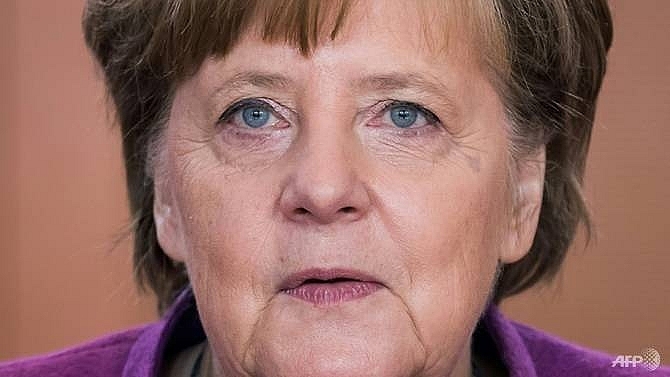Merkel cabinet complete as SPD claims key finance, foreign ministries
 |
| Germany's second biggest party, the Social Democrats, on Friday (Mar 9) named their ministers in Chancellor Angela Merkel's next government, completing a cabinet lineup in which they snatched the trophy finance and foreign affairs portfolios. |
Olaf Scholz, 59, the interim leader of the Social Democrats (SPD), will take over the powerful finance ministry which in recent years was led by fiscal hawk Wolfgang Schaeuble of Merkel's Christian Democrats (CDU).
Heiko Maas, the SPD's outgoing justice minister, will take the prestigious post of running the foreign ministry, according to the party's designated next leader Andrea Nahles.
Both Merkel's conservative CDU/CSU bloc and the SPD, the two mainstream parties in Europe's biggest economy, lost millions of votes to far-right populists in last September's election.
This has forced them, after six months of torturous negotiations involving multiple parties, into another unhappy marriage of convenience dubbed a grand coalition or "GroKo".
Merkel, aged 63 and in power for 12 years, is due to formally launch her fourth-term government next Wednesday.
But unrest is brewing within her party following a historically poor election result and Merkel's decision to give up key cabinet posts as the price of holding onto power.
Given the mutual distrust between the two big parties, "it's possible that this coalition won't last four years," one senior CDU source has told AFP. "Unlike in the past, I'm not sure this time."
"EYE ON FINANCES"
The SPD, demoralised by plummeting poll figures and damaging infighting, on Friday celebrated rare good news - the key ministries they have wrested from Merkel's team in tough coalition haggling.
Scholz said the SPD's ministers, three men and three women, were "a good team of people with a high level of expertise and the ability to run large organisations".
Nahles then formally announced that Scholz, the mayor of the city-state of Hamburg, would take over the finance ministry, which has been led in recent months by Merkel's deputy Peter Altmaier, 59.
She said Scholz had led the wealthy river port "with a keen eye on finances, with budgetary discipline on the one hand and future-oriented investments in education, research and infrastructure on the other".
Nahles then introduced incoming foreign minister Maas, 51, praising his "endurance" as a triathlete and the "diplomatic finesse, backbone and clear stance against racism" he had shown as justice minister.
She said this would help Maas, who has little international experience, in a job where Germany increasingly acted "as a mediator in a disorderly world".
Taking over the justice portfolio will be Katarina Barley, 49, a former judge, while Hubertus Heil, 45, becomes labour minister and Berlin local politician Svenja Schulze, 49, takes on the environment post at a time Germany is on course to miss its ambitious climate targets.
"COLD REVENGE"
Absent from the SPD line-up were the two men who have dominated the party in its tumultuous past year - election loser Martin Schulz, who bowed out weeks ago, and outgoing top diplomat Sigmar Gabriel, whose go-it-alone style has long angered Scholz and Nahles.
Nahles - soon to become the 153-year-old labour party's first female leader - has shown, by sending her nemesis Gabriel to the backbenches, that she knows "revenge is a dish best served cold", judged Spiegel Online.
Among Merkel's conservatives, Ursula von der Leyen, 59, stays on in the defence ministry and the chancellor's loyal right-hand man Altmaier is rewarded with the economy and energy ministry.
In a nod to a new generation, outspoken Merkel critic Jens Spahn, 37, becomes health minister while two women, Julia Kloeckner, 45, and Anja Karliczek, 46, take over the agriculture and education portfolios respectively.
Andreas Scheuer, 43, of Merkel's conservative Bavarian sister party the CSU, will become transport minister, wresting with Germany's auto pollution scandal, while Gerd Mueller, 62, stays on as development minister.
Crucially, the embattled outgoing CSU chief Horst Seehofer, 68, as Germany's next interior minister in charge of security takes over a rebranded "homeland" ministry in a bid to answer the challenge of the new far-right.
What the stars mean:
★ Poor ★ ★ Promising ★★★ Good ★★★★ Very good ★★★★★ Exceptional
 Tag:
Tag:
Related Contents
Latest News
More News
- Russian President congratulates Vietnamese Party leader during phone talks (January 25, 2026 | 09:58)
- Worldwide congratulations underscore confidence in Vietnam’s 14th Party Congress (January 23, 2026 | 09:02)
- Political parties, organisations, int’l friends send congratulations to 14th National Party Congress (January 22, 2026 | 09:33)
- 14th National Party Congress: Japanese media highlight Vietnam’s growth targets (January 21, 2026 | 09:46)
- 14th National Party Congress: Driving force for Vietnam to continue renewal, innovation, breakthroughs (January 21, 2026 | 09:42)
- Vietnam remains spiritual support for progressive forces: Colombian party leader (January 21, 2026 | 08:00)
- Int'l media provides large coverage of 14th National Party Congress's first working day (January 20, 2026 | 09:09)
- Vietnamese firms win top honours at ASEAN Digital Awards (January 16, 2026 | 16:45)
- ASEAN Digital Ministers' Meeting opens in Hanoi (January 15, 2026 | 15:33)
- ASEAN economies move up the global chip value chain (December 09, 2025 | 13:32)






















 Mobile Version
Mobile Version